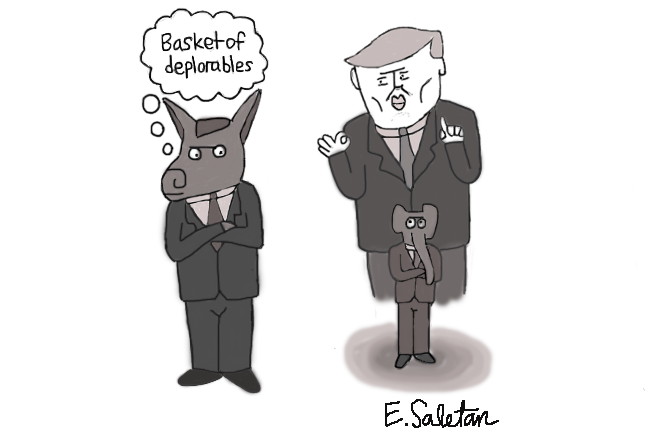Reaching across the aisle when policies trump persona
January 3, 2018
A year after the election of Donald Trump, our country is still polarized between his supporters and detractors. In the liberal community of Bethesda, it’s common to hear critical remarks about the president and his policies, but it’s just as common to hear insults about the people who voted for or support him.
The tendency to make generalizations about Trump supporters has become commonplace because they’re often equated with Trump’s worst qualities: racist, sexist, contemptuous, arrogant, etc. After all, Trump has been caught on tape bragging about groping women. He repeatedly questioned Obama’s citizenship, with no legitimate evidence. He called Mexican immigrants criminals and rapists. And so people assume that in order to vote for Trump, his supporters have to be able to forgive those things, which immediately equates them with those aforementioned qualities. In reality, people don’t have to forgive Trump to support him. If someone is desperate enough for representation in government, Trump could feel like the only hope. These people support Trump’s policies. Not his personality.
Businesses Insider did a study of 100 Trump supporters, asking them the question: What don’t you like about Trump? Not surprisingly, their most common answer was Trump himself. People believed Trump was the only person who was going to fight for the change they wanted to see, but they were wary of many of the more hateful things he’d said.
The sentiment expressed here is desperation. Trump supporters like this don’t necessarily want a racist, misogynist president. They just want someone who will help them.
When Trump ran, he promised his supporters a lot. For example, he said he would get rid of trade agreements that were taking jobs out of the country. While the benefit of this action is debatable, it isn’t racist or misogynistic. The Carrier Plant, a company in Indianapolis, was going to lay off 1,400 workers to relocate to Mexico. When then President-elect Trump promised dejected workers that he was going to make a deal with the company to let them stay, they were overjoyed.
People like this can’t be thrown into a pool of overgeneralizations about Trump supporters. Instead, Democrats should learn what they can do to help workers like these. It serves no purpose to assume that all Trump supporters support him for his most egregious traits. This can only divide and cause irrational anger. Trump threw these workers a lifeline. Like many of his supporters, they thought that he was their only hope.
There is, of course, an intersection between Trump’s personality and his policies. While this makes some of his policies, like the idea to build a wall, highly controversial and debatable, issues such as this could not deter his most passionate, one-issue voters—especially if that one-issue concerned their livelihoods, their religion or the wellbeing of their family.
At the time of the election, many people felt unheard in government, and Clinton was promising to run an administration similar to Obama’s—a quick turn-off for those unhappy with the status quo. Simply put: people couldn’t afford to care about the far-fetched things Trump said. They had to assume he was exaggerating. It was the only way to swallow such bitter a pill.
During the campaign, my family and I supported Clinton. Yet we didn’t think it was okay that she had deleted 33,000 emails when she was secretary of state. We supported her for her policies. We didn’t condone her mistakes. It’s the same with a lot of Trump supporters.
What gives these stereotypes the time to really take hold is the lack of proper communication between the two sides of the political spectrum. Forty-seven percent of liberals say that they don’t just hate Trump supporters—they can’t even stand to be around them, the Washington Post reports. This not only perpetuates intense divisions in our country, but also allows stereotypes to prosper. Without really listening to Trump supporters, it’s hard to think about them fairly.
Both sides of the political spectrum should work on having conversations. Liberals should try reading Fox News (with an open mind), and Republicans the Washington Post.
To create a productive community across party lines, we need to acknowledge Trump supporters for what many of them are: people who were looking for specific policies and felt like Trump was the only person who could deliver.
We don’t have to like all Trump supporters. Some of them may even to live up to the stereotype. But we can’t close our minds before even giving them a chance. It’s dangerous and offensive to assume all of them support the racist, sexist, or otherwise cruel comments that Trump has made. Many of them are just hoping to see change, and that’s not unreasonable.








Anthony Dorazio • Mar 3, 2018 at 4:04 pm
You wrote: “He called Mexican immigrants criminals and rapists.”
He called some of them criminals and rapists. I applaud your endorsing more understanding between us Trump fans and Clinton supporters, and to get there we need clarity of speech and not needless drama.
You may find interesting this series of interviews with progressive activists to understand them better. https://youtu.be/d95MCkP8CoU?list=PLzOgMx8Hr1NSvn_HHog-zGL710ezAydpL